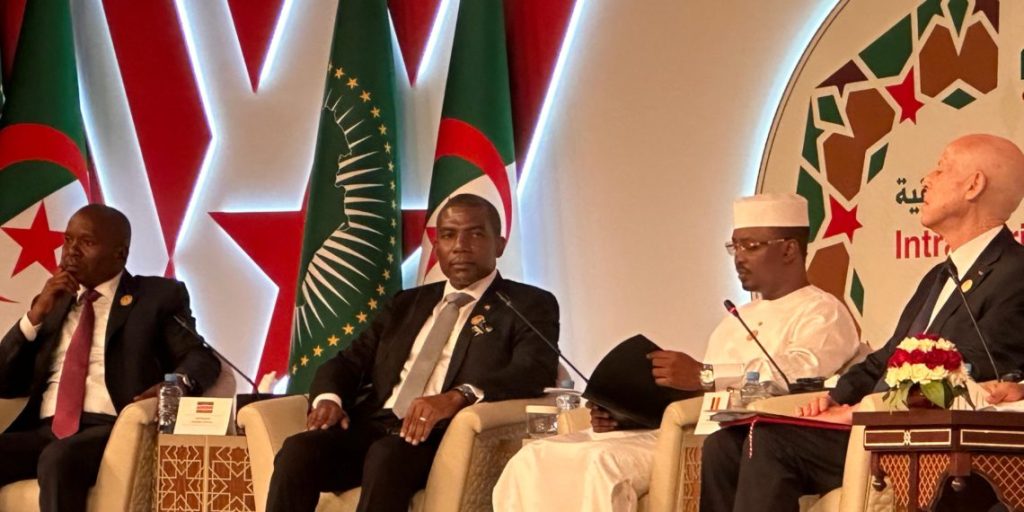Prime Minister Drew Advocates for Increased Africa-Caribbean Trade and Economic Renewal
Prime Minister Terrance Drew of St. Kitts and Nevis delivered a compelling address at the Intra-African Trade Fair in Algiers, advocating for a transformative shift in the historical narrative of the transatlantic slave trade. He urged leaders to envision a “Trans-Atlantic bridge of hope,” fostering trade, investment, and shared development between Africa and the Caribbean. Addressing a distinguished panel chaired by Algerian President Abdelmadjid Tebboune, Prime Minister Drew emphasized the Caribbean’s integral role in Pan-Africanism and highlighted potential avenues for strengthening Africa-Caribbean partnerships. He positioned the current low trade volume between the regions, estimated at 1% or less, not as a sign of weakness but as a tremendous opportunity for growth and collaboration.
Prime Minister Drew underscored the historical context of trade between Africa, the Caribbean, and Europe, acknowledging the painful legacy of the triangular Atlantic slave trade. He proposed a paradigm shift, urging a focus on building a future of mutual benefit rather than dwelling on past exploitation. This “Trans-Atlantic bridge of hope” would symbolize a new era of cooperation, rewriting the narrative of transatlantic relations and fostering prosperity for both regions. This vision involves leveraging existing strengths and exploring new avenues for collaboration in various sectors. The Prime Minister cited nascent collaborations with African nations in education, referencing partnerships with the Open University of Tanzania and vocational studies programs in Kenya, with further expansion planned in Ghana. He presented these initiatives as the initial steps in a broader strategy for deepening Africa-Caribbean ties.
Prime Minister Drew outlined key areas for enhanced cooperation, including emerging technologies, agriculture, renewable energy, tourism, healthcare, sports, and the creative industries. He highlighted specific examples, such as the potential for geothermal energy collaboration with Kenya and the transformative impact of direct air links on tourism between the two regions. These examples illustrate the practical steps that can be taken to realize the vision of a “Trans-Atlantic bridge of hope.” By focusing on these key areas, the Prime Minister suggested, both regions can leverage their respective strengths and create mutually beneficial partnerships. He emphasized the importance of a proactive approach, where both Africa and the Caribbean actively shape their shared future rather than being passive recipients of external forces.
The Prime Minister’s address also placed the discussion within the broader context of the Pan-African movement, invoking historical figures such as Bob Marley, Marcus Garvey, George Padmore, and Kwame Nkrumah. He reaffirmed the Caribbean’s historical commitment to Pan-African ideals of liberation and unity, emphasizing the region’s continued dedication to this shared struggle. This historical grounding adds weight to the Prime Minister’s call for increased cooperation, positioning it not as a novel concept but as a continuation of a long-standing commitment to Pan-Africanism. He framed the current efforts to strengthen Africa-Caribbean ties as a continuation of the historical struggle for self-determination and unity, emphasizing the importance of shared agency in shaping a future of mutual prosperity.
Prime Minister Drew’s message underscored the Caribbean’s deep interest in forging stronger ties with Africa, recognizing the continent as its sixth region. He stressed that increased collaboration would create opportunities for the people of both regions while enabling them to rewrite their shared history. This rewriting, he emphasized, would be driven by the regions themselves, reflecting their own interests and aspirations rather than external narratives. This emphasis on self-determination and agency highlights the importance of proactive engagement in shaping a shared future.
In essence, Prime Minister Drew’s intervention was a call to action, urging a shift from a historical narrative of exploitation to one of mutual empowerment. He urged leaders to embrace the “Trans-Atlantic bridge of hope” as a guiding principle for future relations, fostering trade, investment, and shared development between Africa and the Caribbean. His emphasis on specific areas of cooperation, coupled with the historical context of Pan-Africanism, provided a roadmap for realizing this vision. The Prime Minister’s message resonated as a powerful call for unity, self-determination, and a shared future of prosperity for both regions. He urged the attendees to see the current low trade volume not as a barrier, but as an immense opportunity to build a future of mutual benefit, rewriting the history of transatlantic relations through cooperation and shared prosperity.
Share this content:












Post Comment